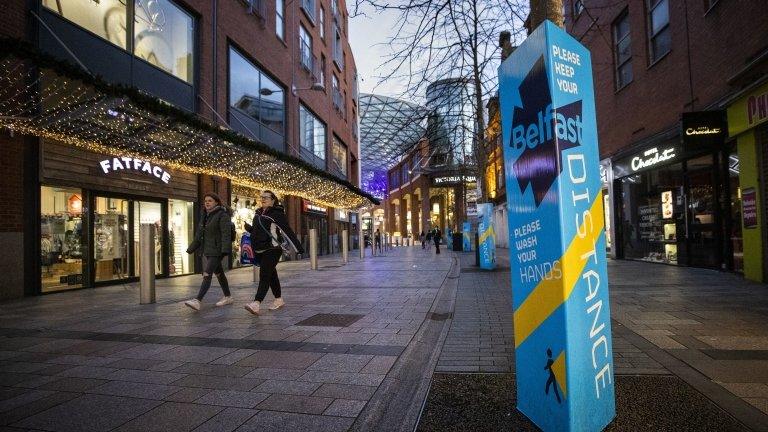Covid-19: 'Stay at home' to become law in NI on Friday
- Published
- comments
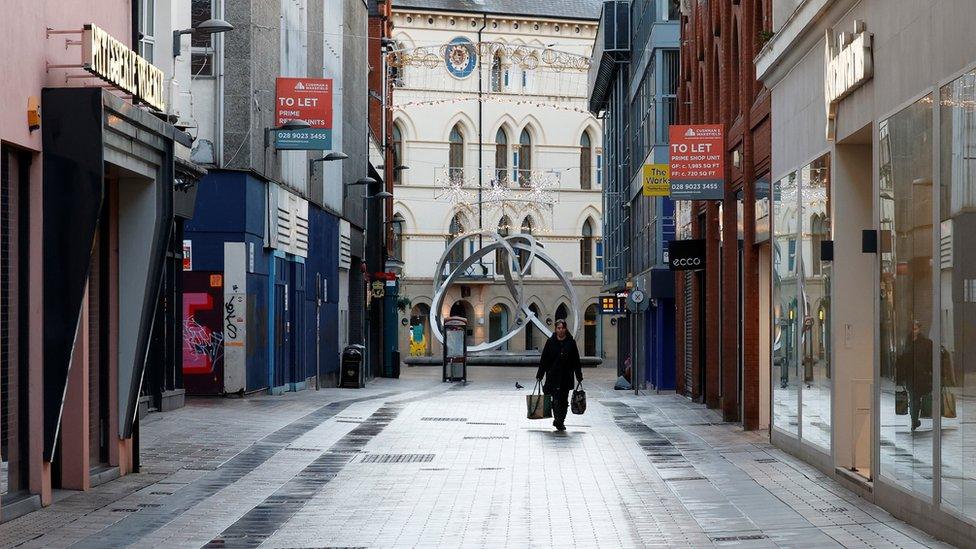
Northern Ireland's lockdown is set to have further restrictions attached
An order for people in Northern Ireland to stay at home - to stop the spread of Covid-19 - will become legally enforceable from Friday.
The executive agreed the move after it met on Tuesday and tightened other measures.
It will mean people can only leave home for medical or food needs, exercise and work that cannot be done from home.
NI is in the second week of a six-week lockdown in which non-essential retail is closed.
As it happened: Executive agrees new lockdown rules
Ministers also agreed to a proposal from Health Minister Robin Swann to reintroduce enforcement powers for the PSNI to order people to go home if they are engaging in prohibited activity.
Speaking after the meeting, First Minister Arlene Foster said people should not wait for the regulations to take effect and insisted people should already be staying at home.
Deputy First Minister Michelle O'Neill said Northern Ireland faced a "difficult period ahead", but that the interventions were necessary.
However, she said the executive had not reached agreement on whether GCSE or A-level exams should go ahead, and that further meetings would need to take place later this week.
"We will also have an urgent meeting convened tomorrow with faith groups, hopefully moving them all to online services," she added.
What else is changing?
Indoor and outdoor gatherings will be reduced from 15 people to six and only from two households, which will include children under 12 - exemptions will apply such as support bubbles.
People will no longer be allowed to meet with other households in private gardens, although similar exemptions will apply there too.
However, people will be allowed to take exercise outdoors with one person from another household.
The executive also supported a proposal from the health minister to make it a requirement for all employers to conduct a risk assessment where employees are required to work away from their home.
Ministers agreed the measures will last until 6 February, and be reviewed along with other lockdown measures on 21 January.
What about schools?
Many pupils will not return to school until after the half-term break in mid-February, with nursery, primary and post-primary schools carrying out remote learning until then.
However, ministers agreed that special schools will remain open as usual.
Vulnerable children and children of key workers will have access to schools for supervised learning.
Childcare settings will be allowed to remain open and childminders can continue their services.
Payments to parents of children who receive free school meals will also continue, the Department of Education has confirmed.
Discussions on exams took place, but ministers agreed to revisit this issue.
Education Minister Peter Weir said: "Work is ongoing on this issue as a matter of urgency and I intend to provide further clarity in the next couple of days.
"Until and unless any announcement is made, students should expect to continue to sit scheduled examinations."
On Tuesday evening, Economy Minister Diane Dodds said "further flexibilities" would be put in place for January exams and assessments, particularly in relation to BTecs.
She said: "Learning centres, including further education colleges, schools and training providers, will be afforded additional discretion to determine whether it is appropriate for learners to sit the scheduled BTec exams in January, taking into consideration a range of factors including health and safety and the personal circumstances of their learners."
It has also been confirmed that post-primary school transfer tests have been cancelled this month due to the surge in the number of coronavirus cases.
The first transfer test, used by many grammar schools to select pupils, was due to take place on Saturday.
But the Association for Quality Education (AQE) later announced that a single transfer test would be held on Saturday 27 February.

The guidance for those who are clinically extremely vulnerable - and had to shield during the first lockdown in March - is not expected to change.
Ministers are due to brief the Northern Ireland Assembly on Wednesday.
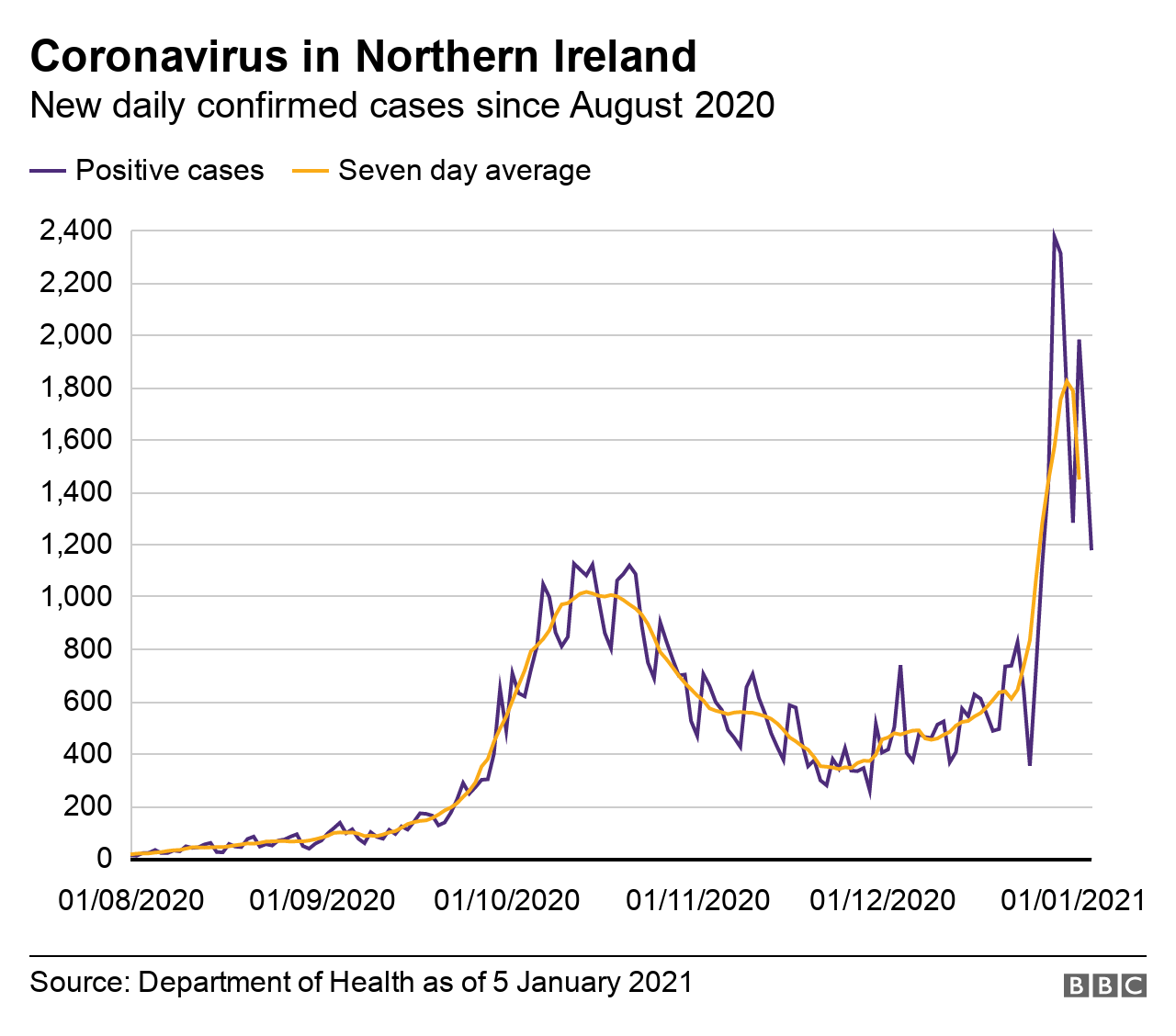

On Tuesday, a further 18 coronavirus-related deaths - 11 in the past 24 hours and seven in the past week - were recorded by Northern Ireland's health department, bringing its death toll to 1,384.
The department recorded a further 1,378 cases of the virus, with 577 confirmed patients in hospital, 45 of whom are in intensive care.
More than 12,000 cases have been reported in the past seven days, more than double the previous week.
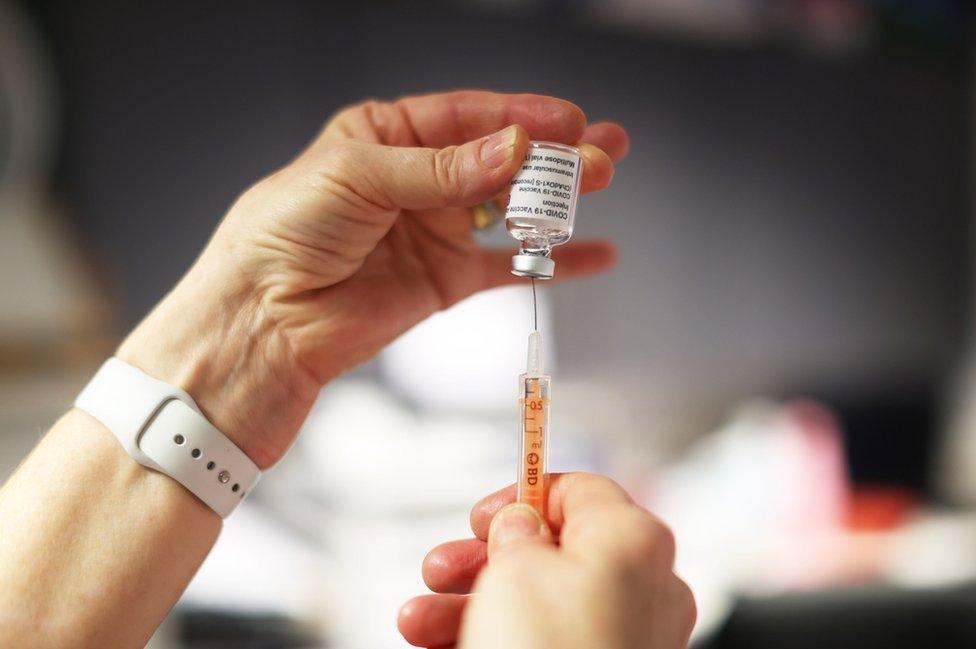
A vaccination programme started in Northern Ireland in December
Northern Ireland's director of the Royal College of Surgeons warned the health service could soon struggle to deal with the number of people needing treatment.
"That's not just the Covid patients - it's the patients who have a heart attack, a stroke, the people who fall and break their hip," said Dr Mark Taylor.
"But the difficulty is the more the system is pulled to deal with Covid, the less ability we have to deal with other aspects.
"The more Covid overwhelms the intensive care units then we're into really difficult ethical decisions... which no doctor wants to make in terms of who requires that ventilator."
Related topics
- Published5 January 2021
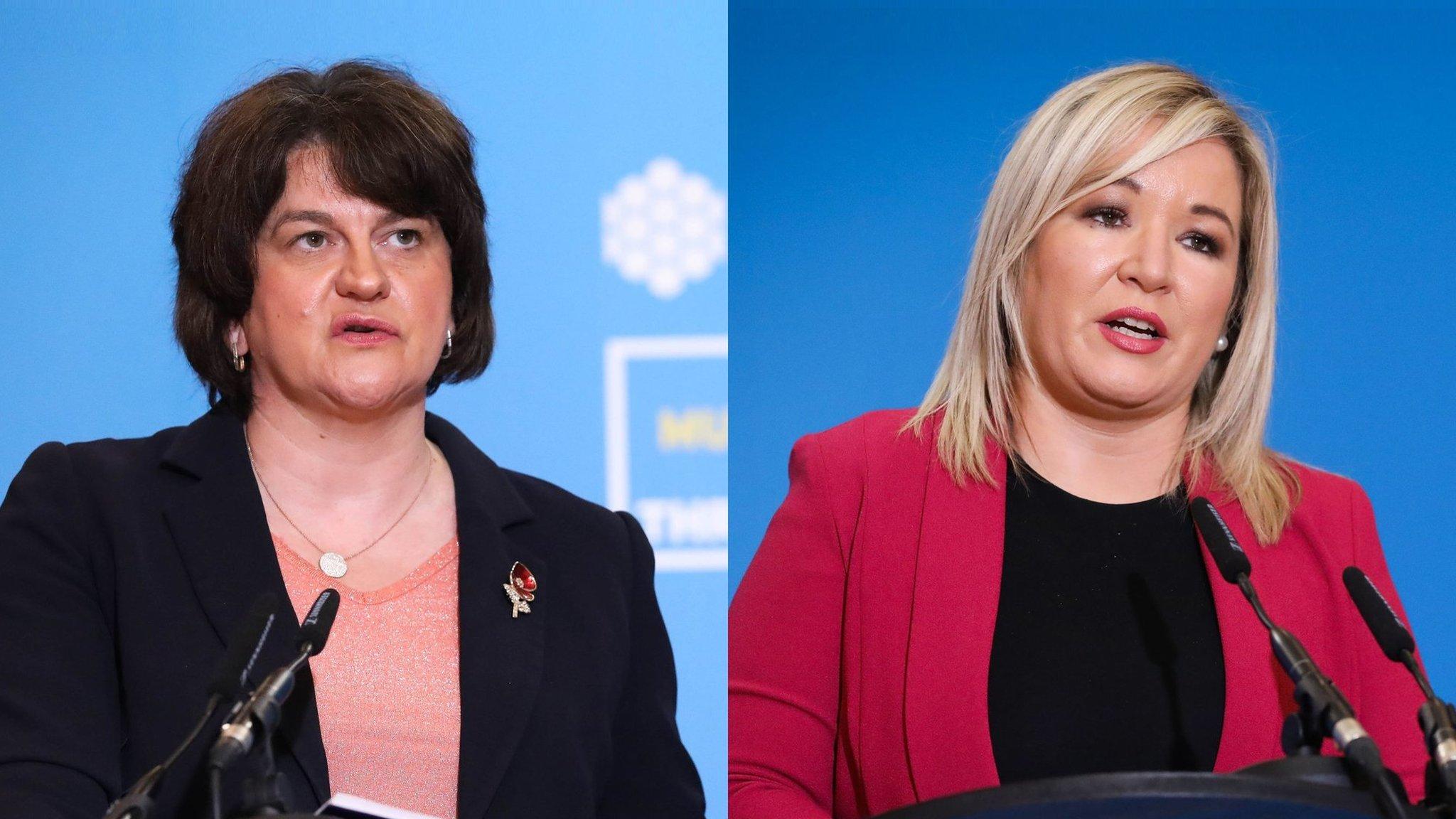
- Published29 July 2021

- Published7 May 2021
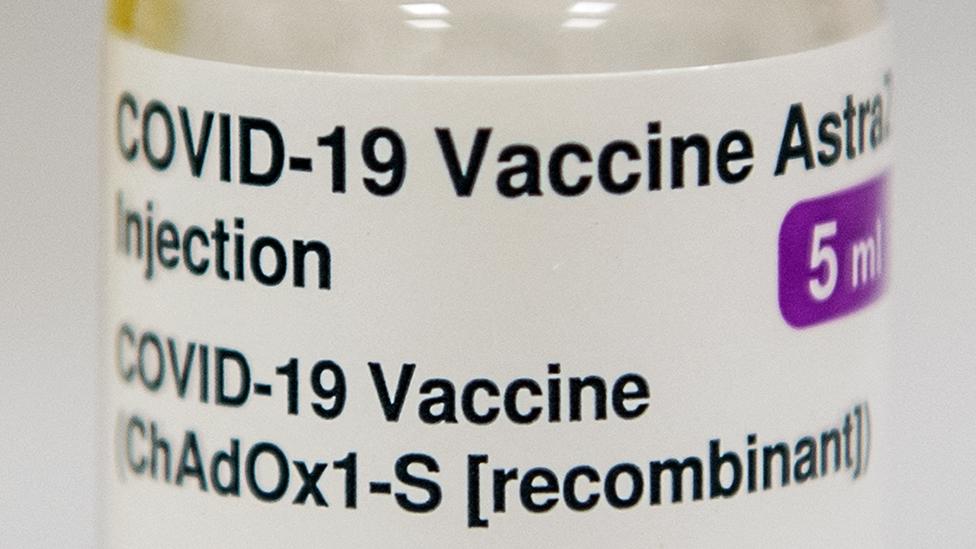
- Published28 May 2021
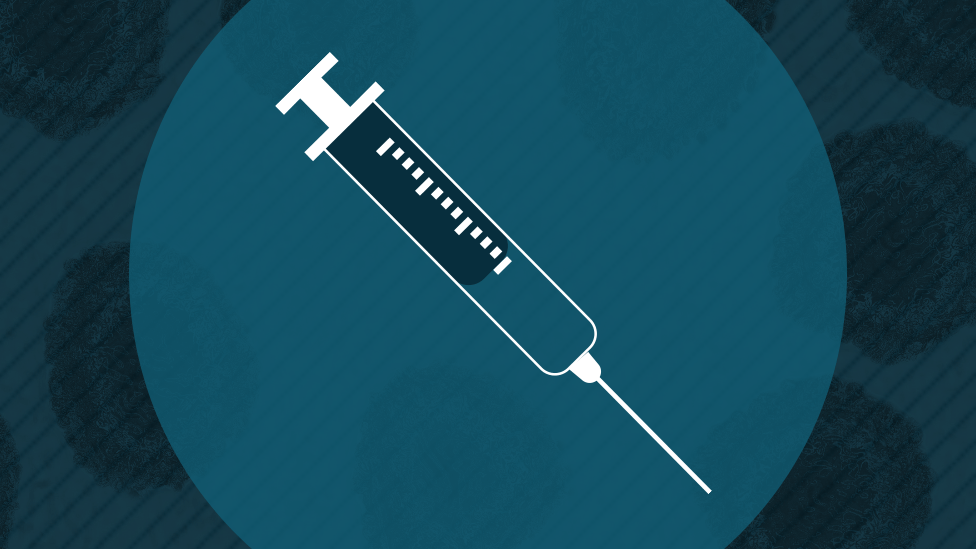
- Published17 December 2020
